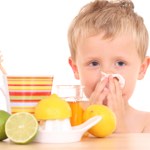
Staying Healthy Through the Holiday Season
Disease Family Holidays
It's the holiday season! In this time of joy and cheer, relatives are coming to town, rooms need to be cleaned, and tables need to be filled. The children make their wish lists for Santa and eagerly anticipate Christmas morning for their well-deserved gifts. However, for the parents, more dreaded than coal may be a sudden cold or flu in the household.

Staying Healthy Through the Holiday Season
Disease Family Holidays
It's the holiday season! In this time of joy and cheer, relatives are coming to town, rooms need to be cleaned, and tables need to be filled. The children make their wish lists for Santa and eagerly anticipate Christmas morning for their well-deserved gifts. However, for the parents, more dreaded than coal may be a sudden cold or flu in the household.
One cold or flu could contaminate the whole house, as well as those who may be traveling to visit. Additionally, those traveling have equal chance of also being affected en route. Knowing how to protect your loved ones and being proactive in staying healthy through the winter cold and flu season is critical to make the most of this joyous time.
What is the Flu?
The flu, also known as influenza, is a viral respiratory illness. It acts as a microscopic infectious agent to invade the cells of the body, making people sick. Its symptoms include cough, sore throat, and stuffy nose-- all of which are also common in the common cold. However, the flu also can be accompanied by fevers, cold sweats, body and head aches, exhaustion, and occasional gastrointestinal problems, like vomiting and diarrhea. It is highly contagious, hospitalizing approximately 200,000 people a year and killing around 36,000, and its effects are most threatening for the elderly, very young, and those with weak immune systems.1
Why Do We Get the Flu in Winter?
The flu season begins in early October, reaches its peak around February, and ends in March. So, what is it about this time that makes the flu so much more common? While it is possible that the cold itself could strengthen the virus, the cold can also contribute to behavioral changes within society that are more conducive to falling ill.
In the winter months, days are shorter and sunlight is significantly reduced, and the cold often leads people to stay inside. Both decreased sunlight and fewer outings contribute to decreased levels of vitamin D and melatonin, which require sunlight to regenerate. The lack of these essentials results in the weakening of the immune system, resulting in the body's decreased ability to fight off the virus. Additionally, the increased time spent indoors, often with the windows shut, circulates air that could be contaminated and increases the likelihood of contracting the virus. 2
What Else Could Weaken My Immune System and How Can I Address It?
Insufficient Sleep
Not getting enough sleep can lead to higher levels of stress hormones and to more inflammation in the body.3 Researchers are still studying how sleep works in boosting the immune system, but it's evident that the suggested 7 to 9 hours for an adult is necessary to maintain good health.
Poor Diet
Diets that are rich in sugars and carbs impact immune system cells that attack bacteria, and their effects on the immune system can last hours after consumption. Consuming more fruits and vegetables provides the body with vitamins like vitamins C and E, zinc, and beta-carotene. Variety is key in any healthy diet, so eat the rainbow! Berries, kale, spinach, citrus fruits, and carrots! Foods like garlic are particularly good for the immune system and can help fight off viruses and bacteria.
Little Exercise
Low amounts of exercise often correlate to poor health, especially gut health. Consistent, moderate exercise a few times a week can help your immune system fight off infection and also provide a boost in "feel-good" chemicals, helping you sleep better.
Smoking and Drinking
Smoking and drinking can both drastically affect your gut health, and should only be done in moderation at most. Excessive amounts of either can damage the immune system and keep cells from fighting off infections and bacteria. Additionally, cigarettes contain over 4,000 chemicals that are toxic to the body and its cells and alcohol often contains high concentrations of sugar.
Dehydration
Dehydration means that the body is not getting enough water, which is important to keep your body and immune system in a healthy condition. Water helps the body to flush toxins and wastes, which allows the immune system to fight off infection better. Further, dehydration exhausts the body and affects sleep cycles, resulting in poor sleep and, typically, decreased motivation to exercise.
High Stress
Stress can have a significant impact on your immune system. With chronic stress, the adrenal glands release extra cortisol to help your body manage. Elevated cortisol decreases the production of healthy prostaglandins, which keep the immune system healthy. Elevated cortisol levels cause immune system cells to disappear from the blood. Slowed prostaglandin production can cause inflammation and immune suppression. Decreasing stress through excerise, meditation, or other healthy coping mechanisms can help keep cortisol levels at the body's preferred levels and help keep your immune system at its best.
Poor Hygiene
The first line of defense in keeping germs from getting into the body is maintaining proper hygiene: washing hands before preparing food, after using the bathroom, and after interacting with someone who may be sick, not touching the eyes nose or mouth, and avoiding those you may know to be sick.
Supplements to the Rescue
NuMedica makes several professional-grade supplements that can help strengthen your immune system and minimize the impact of colds and flu. You can find these listed on the Supplements tab.

Bailey Todtenbier is a university neuroscience student and Content Developer for SupplementRelief.com. She has been writing for SupplementRelief.com as a part of the team since January 2020 and writes articles and blog posts on wellness, healthy lifestyles, and supplement technology.
Learn more about Bailey Todtenbier.
-
 Discussion Forum
Questions or Feedback?
Discussion Forum
Questions or Feedback?Ask questions. Share your thoughts. Note that we cannot answer questions relating to specific medical conditions - please refer those to your qualified healthcare provider.
Post a new Comment or Reply to an existing one. Help for using the Discussion Forum.
 Discussion Forum Help
Discussion Forum Help
Comments are displayed in order of the last one posted so the most recent one is at the top and the oldest one at the bottom.
Replies within a Comment are displayed in reverse order with the oldest one at the top and the most recent one at the bottom.
Each post identifies
 who made the post and the
who made the post and the  date and time the post was made.
date and time the post was made.Mouse over the icons for tooltips that explain what they mean.

If you see this icon you can attach an Audio file to your post.

If you see this icon you can attach a Document file to your post.

If you see this icon you can attach an Image file to your post.

If you see this icon you can attach a Video file to your post.
You will see the
 Ban icon (Report Post as SPAM) immediately following the Timestamp of the post. Click this icon if you feel strongly that the content posted is not appropriate and should be reviewed by the Forum Moderator. You will be provided with a confirmation dialog to be sure you wish to submit this post for review. If submitted, the Forum Moderator will be notified to review the post and will determine what type of action to take.
Ban icon (Report Post as SPAM) immediately following the Timestamp of the post. Click this icon if you feel strongly that the content posted is not appropriate and should be reviewed by the Forum Moderator. You will be provided with a confirmation dialog to be sure you wish to submit this post for review. If submitted, the Forum Moderator will be notified to review the post and will determine what type of action to take.Click
 in the upper right corner of this Help modal or anywhere on the web page outside of the modal to exit Help.
in the upper right corner of this Help modal or anywhere on the web page outside of the modal to exit Help.
![]() Session Expired from Inactivity
Session Expired from Inactivity
Do you want to?
9618 Jefferson Highway, Suite D-191
Baton Rouge LA 70809-9636
(888) 424-0032 |
support@supplementrelief.com
* Disclaimer: This page is available exclusively for SupplementRelief.com clients. None of the information on this website is intended to replace your relationship with your healthcare provider(s). Nothing should be considered medical advice. The information, knowledge, and experience shared on this website are the opinions of SupplementRelief.com. This site and its content are intended to enhance your knowledge base as YOU MAKE YOUR OWN HEALTHCARE DECISIONS in partnership with your qualified health professional.
* These statements have not been evaluated by the Food and Drug Administration. These products and services are not intended to diagnose, treat, cure, or prevent disease.
* There is NO GUARANTEE OF SPECIFIC RESULTS for the products or services offered, and the RESULTS CAN VARY for each individual. Any results claimed by our customers are based on individual experiences that are unique and cannot be guaranteed.
FirstFitness Nutrition and NuMedica may be promoted and sold on the internet ONLY by Authorized Resellers who have been approved by and have registered their website domain with these companies. They strictly prohibit, and actively monitor, the UNAUTHORIZED SALE or RESALE of their products in ALL online public shopping portals including Amazon, eBay, and others and into other countries. All products purchased in SupplementRelief.com are for PERSONAL USE ONLY and CANNOT BE RESOLD to others. Please report violations of Reseller Policy directly to FirstFitness Nutrition at 800.621.4348 and to NuMedica at 800.869.8100.
The content and photographs on this website are copyrighted or Licensed Material and may not be downloaded for other than personal use. Republication, retransmission, reproduction, or any other use of the content or photographs is prohibited. ©2010-2024 SupplementRelief.com.
Are you sure you want to remove this item?

